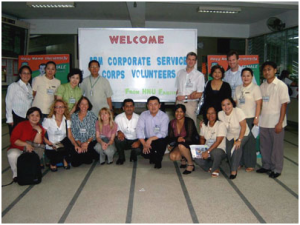On May 31st USAID announced a partnership with IBM and CDC Development Solutions, an NGO that focuses on international corporate volunteerism (ICV), which USAID believes will make ICV more effective and sustainable. The partnership spawned a new agency: The Center of Excellence for International Corporate Volunteerism (CEICV), which will be funded by USAID, IBM, and CDC Development Solutions for a two year pilot period and will then hopefully become self-sustaining, funded by membership fees and other sponsorships. The center will promote “citizen-diplomats,” skilled employee volunteers from various corporations who will teach and advise local governments, small businesses, and civic groups in emerging markets as a method of international economic development and aid.
IBM already has a program similar to this, the Corporate Service Corps, which has sent over a thousand volunteers to almost twenty countries, mostly in Africa, since its launch in 2008. Employees who seek out the opportunity to volunteer abroad are carefully vetted to ensure that their projects are practical and sustainable, and though the volunteers are only in-country for about a month, they remain in close contact with their partners abroad long after they return. The projects that the employees undertake are designed to improve local economic conditions, support entrepreneurship, and to enhance transportation, education, and healthcare. IBM is an ideal partner for USAID in this new venture. IBM and CDC Development Solutions have a lot of experience in ICV, and so will provide advice in areas such as employee training, managing complex projects, and ensuring that those projects are in line with a company’s business goals and achieve the best results possible.
carefully vetted to ensure that their projects are practical and sustainable, and though the volunteers are only in-country for about a month, they remain in close contact with their partners abroad long after they return. The projects that the employees undertake are designed to improve local economic conditions, support entrepreneurship, and to enhance transportation, education, and healthcare. IBM is an ideal partner for USAID in this new venture. IBM and CDC Development Solutions have a lot of experience in ICV, and so will provide advice in areas such as employee training, managing complex projects, and ensuring that those projects are in line with a company’s business goals and achieve the best results possible.
In this era of declining federal budgets, projects like this are becoming increasingly important, and so they should receive a lot more attention than they generally do. The United States has one of the lowest international aid budgets, with less than 1% of the federal budget going to foreign assistance, and most other industrialized nations aren’t much better, especially given the economic difficulties of the past couple years. So corporate programs and NGOs are doing the bulk of the work when it comes to international aid and development, but receiving very little attention for it. I mean, how many of us can say they had heard of IBM’s Corporate Service Corps, or of ICV for that matter, before about 15 seconds ago? And yet the Corporate Service Corps has initiated over 100 projects designed to boost local economies and improve conditions since 2008. Private-public partnerships like the newly formed CEICV deserve to be better known, as they have the capacity to move millions of dollars and to provide expertise for development assistance from the American private sector at no extra cost to taxpayers. Further, corporate initiatives are much more nimble than government aid programs, as they are able to adapt to local circumstances in the countries in which they are working in a way that publicly funded initiatives often cannot.
The CEICV (and others) also deserve more attention to ensure that they succeed in achieving their goals. For example, the CEICV aims to provide sustainable solutions, but without anyone to hold them accountable, how will we ever know if they are achieving this goal? This blog, after all, is dedicated to challenging projects and initiatives to meet a higher standard of impact, and so its very existence is proof that while many organizations have admirable goals and good intentions they often fail to make a real, lasting change. The CEICV and the three organizations that founded it, are dedicated to self-sustaining and practical projects, very admirable goals, but only time will tell if they are able to succeed where many others have been less successful. And who will know if they do? Will any of their future projects make it to the American press, or will this be the last thing you ever read about the CEICV?


